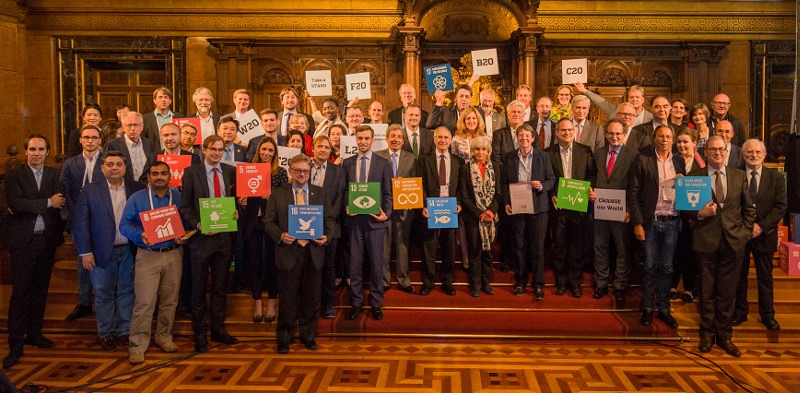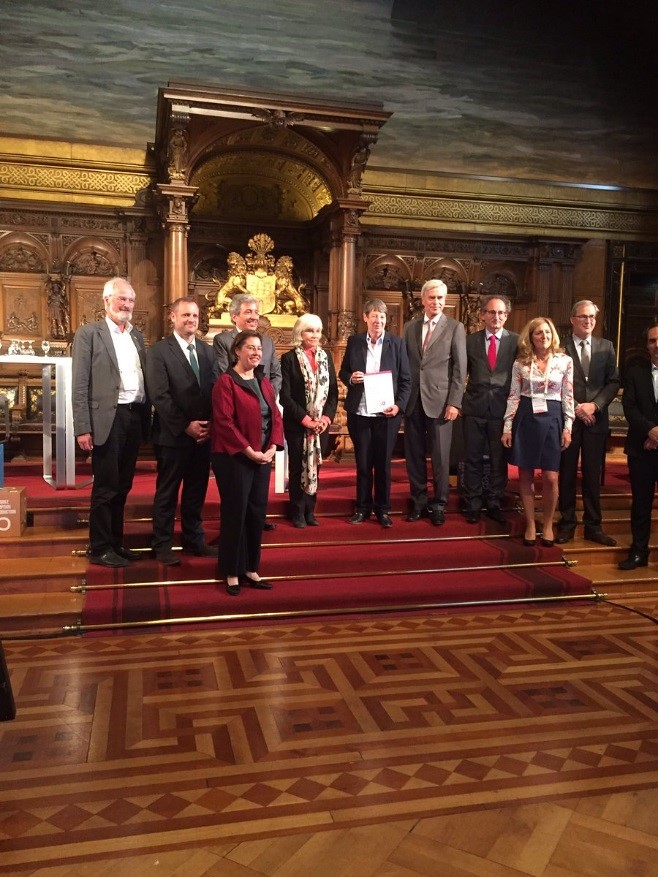Foundations 20 (F20): Non-Governmental Actors in Global Governance

At the Group of Twenty Leaders Summits (“G20”) and its affinity groups, like the Business 20, Youth 20, and Women 20, we are seeing the emergence of new groupings of international multi-stakeholder action that are forcing the powers-that-be to acknowledge and act upon the wishes of real people. The world needs more of this.
One example of such innovative new global advocacy is the Foundations 20 Platform (or “F20”), a new grouping of private foundations that gathered around the Hamburg G20 Summit in July 2017 to raise awareness on climate change, and to pressure G20 member states to maintain a high-level of ambition on implementing the new Sustainable Development Goals (SDGs) and the Paris Climate Change Agreement.

Keith Porter is in the first row, 5 from the left, yellow tie (Source: World Future Council)
This commentary details why and how the Stanley Foundation joined the F20 Platform, Stanley’s experiences within the F20, the accomplishments that were achieved from Stanley’s perspective, and some thoughts regarding next steps and future options.
Road to the F20
In May 2017, the Stanley Foundation was contacted by Klaus Milke, the Chairman of the board of Germanwatch, who invited us to join a new group of like-minded foundations that were assembling to try to influence G20 leaders on the issue of climate change at the July 2017 G20 summit to be held in Hamburg, Germany. Other foundations that had already signed up included the European Climate Foundation, Michael Otto Stiftung, Rockefeller Brothers Fund, Shakti Sustainable Energy Foundation, and WWF.
The idea of Germanwatch and the other foundations in the grouping that would soon become the “F20” was that they could mirror the other public engagement groups that have been created on the side of the G20 Leaders’ Summit, namely:
- Business 20 (“B20”), the G20 dialogue with the global business community to consolidate and represent business interests;
- Think Tank 20 (“T20”), the G20 dialogue with think tanks to provide research-based policy advice;
- Youth 20 (“Y20”), the official youth forum of the G20; and the
- Women 20 (“W20”), the G20 dialogue with women NGOs, female entrepreneur associations and scientists to push forward women’s economic participation and empowerment
These “dialogue groupings” have emerged at the Track 1.5 level to advise and influence the official, Track 1, government-led G20 policy agenda.
The withdrawal of the United States from the Paris Agreement had heightened demand for a strong G20 stand on the newly-agreed global climate change effort.
As the Germanwatch board and the assembling F20 were eager to have more United States-based institutions join the F20, Milke reached out to the Stanley Foundation knowing that we had a long-time commitment to promoting multilateral action, as well as a more recent focus on climate governance.
 Germanwatch felt strongly that, as part of the F20, "We need all players and actors to show up and say that we have to move forward and that no government or single politician can stop us."
Germanwatch felt strongly that, as part of the F20, "We need all players and actors to show up and say that we have to move forward and that no government or single politician can stop us."
The Stanley Foundation decided to join the F20 platform after doing a review of F20 principles, and after holding internal discussions, and Skype conversations with Milke and Martin Bosak, who coordinated the F20 platform work on behalf of the World Future Council.
The Stanley Foundation joined for three primary reasons: First, we saw value in adding our voice and support to the multilateral approach being promoted by the F20. Stanley Foundation has a long history of supporting multilateralism and multilateral cooperation, stretching back to 1956. Our work has long included support for international cooperation around United Nations reform efforts, securing vulnerable nuclear material, and increasing support for the Responsibility to Protect. Second, we saw this as a great networking opportunity to meet leaders from other foundations around the world, as well as to interact with the influential government decision-makers from 20 important nations and the heads of major international organizations that would be gathering for the G20. The Stanley Foundation has been attending side meetings of the G20 summit, and before that, G8+G5 summits since 2008. And third, we saw this as a significant moment to check the temperature of the global climate movement in the weeks after U.S. President Trump announced that the United States would withdraw from the Paris Agreement.
Impact in Hamburg
At the time that we joined the F20, the group was drafting the document to be presented to world leaders at the July G20 summit and planning the activities and meetings for July 3, 4, and 5, 2017, in Hamburg, prior to the Leaders’ Summit, to highlight the profile of the F20 statement, and to plan the F20’s next steps. (F20 Agenda - July 3-5, 2017).
On July 3, 2017 in Hamburg, we participated in a small group discussion featuring F20 members and business leaders on the role that foundations and business can play together in advancing global climate change mitigation efforts.
The F20 issued a joint press release the following morning, which called on German Chancellor Angela Merkel to make the implementation of the UN Agreements for climate protection and sustainability “the core responsibility” of the G20 Leaders — “with or without Trump.”
Also on July 4, the F20 Platform issued its Report on “Renewable Energy, Climate Action and Resilient Societies: Accelerating the Global and Local Paradigm Shift,” and media were invited to a press conference to launch the Report at Hamburg City Hall, and for the hand-over of the Report to the German federal environment minister Dr. Barbara Hendricks.
(Watch the F20 press conference and other activities here).
The F20 event on July 4 in Hamburg City Hall brought together over 400 people for a day of sustained discussion on climate change mitigation efforts and the positive impact that governments and other stakeholders can make. Amory Lovins, the American physicist and environmentalist, Chairperson and chief scientist of the Rocky Mountain Institute; Dr. Auma Obama, Chairperson of the Sauti Kuu Foundation in Kenya; Manuel Pulgar-Vidal, head of climate and energy at the WWF and former minister of the environment of Peru; Kurt Bock, CEO of BASF and Chair of the energy, climate and resource efficiency 11 Taskforce; and economist Lord Nicholas Stern of the London School of Economics, among others, gave compelling presentations.
A number of government policymakers and officials participated in the discussions, including German Environment Minister Hendricks. Speaking at our F20 conference, the German environment minister voiced optimism that the G20 could still achieve a “good result” on climate and environmental issues, “despite the adverse global political circumstances” (read: U.S. President Donald Trump’s decision to withdraw from the Paris Agreement). This was a more optimistic tone than Environment Minister Hendricks’ remark at the G7 meeting in Sicily, two months prior (May 26-28, 2017), when she referred to the possibility of the U.S. exit from the Paris agreement as a “shot in the foot.”
Importantly, the F20 members formally presented our “F20 Platform Statement” to the environment minister. Hendricks had signed the Paris Climate Change agreement at the United Nations ceremony in New York City on behalf of Germany in April 2016, and she had a feature role at the G20 Hamburg, where climate and environment were on the center of the agenda of the German G20 presidency.

Source: Stanley Foundation Twitter
When Hendricks signed the Climate Agreement in New York in 2016, she said that, “Now it is important to fill this agreement with life… I want to play my part to strengthen Germany’s role as pioneer.”
The F20 made substantive recommendations for how to ‘give life’ to the UN Agreements, and each speaker stressed the importance of an exciting mix of actors and agency, including civil society, companies, and societal pressure, as driving forces.
Laurence Tubiana, the CEO of the European Climate Foundation, and the architect behind the Paris Agreement (as well as the chief organizer of United Nations Climate Change Conference of the Parties, or COP21), reminded us that, with the Paris Agreement, “…a great movement was launched and everywhere, not just in the official state sphere, we have to accelerate and shift up a gear.” She emphasized that “the global energy transition is being accelerated by an exciting mix of innovation, climate policy and societal pressure:” “Citizens are demanding clean air, business people are recognizing the business potential of climate action and politicians see the [global energy] transition as feasible thanks to dramatic falls in the costs of renewable energy.”
Manuel Pulgar-Vidal, currently at the WWF and formerly the chief organizer of COP20 in Lima, Peru, also emphasized the importance of pursuing joint action among governments, private enterprises, civil society, and sub-state actors in order to achieve the most ambitious climate goals.
Some of the most memorable and potentially innovative suggestions about broadening the stakeholder base came from foundations in the developing world. Auma Obama, Chairperson of Sauti Kuu Foundation in Kenya remarked that the “inevitable transition to a low-carbon economy cannot be enforced from top down. Citizens, stakeholders and civil society must be able to participate.” Dr. Obama emphasized that “African people must be included when talking about climate action. They should not be making the same mistakes as the industrialized countries,” and should look to leapfrog with their development. She added that it is unacceptable that activists risk their freedom, health, and sometimes their lives when they campaign for climate protection and environmental conservation.
Krishan Dhawan, CEO of the Shakti Foundation, India, noted that helping to forge low-carbon and sustainable pathways to development are very important for India, and from a global point of view. “Given India’s growing population, current low levels of per capital energy consumption and urgent development needs,” such efforts are key for both India at the national level, and for the world. Dhawan pointed out that Shakti Foundation is looking to work with “like-minded foundations from across the world” to help forge such a future. At the F20 conference, Shakti joined a panel on the role of civil society and foundations in the global transformation and CEO Dhawan highlighted that the foundation is one of the few actively working in the clean energy and climate change space to build up a “civil society ecosystem,” helping NGOs to create capacity and capability in areas relating to clean energy and new NGOs.
Wang Shi, the founder and Chairperson of China Vanke Co. Ltd, and founder of “C Team” Foundation, offered the following endorsement from a corporate and NGO vantage: that the F20 provides an “excellent global platform for foundations from the biggest developed and developing countries to act together and further advance the agenda of sustainable development.” Wang pledged that, “with the mission of convening and supporting Chinese entrepreneurs as champions of action in addressing climate change,” C Team will “continue to work with international partners to promote green innovation and catalyze the shift to an environmentally friendly growth model.”
Also from a corporate and NGO perspective, Dr. Michael Otto, businessman, and chairman of the Michael Otto Foundation for Environmental Protection and initiator of the Berlin-based Stiftung 2 Grad, emphasized the “co-benefits” of climate protection— in other words, the social and economic opportunities that 195 countries have committed to, with zero emissions by the end of the century. Otto added that “whoever” is developing the necessary technologies, products, and services for this process will be “at the front line of international competition,” and from a business point of view, “it would be risky to be left behind.”
F20 members agreed that our July 4 event was highly relevant; that our positive, solution-oriented style made clear that foundations are willing and able to be part of the solution.
The presentation of the F20 recommendations to the German Environment Minister was important both for its specific recommendations, but also to forging a sense of solidarity among the F20 members that were present. It provided a direct channel for us to make a difference in the policies and implementation of the Paris Agreement.
Reflecting on the results of the G20 Hamburg, the German environment minister Hendricks wrote that “numerous expert meetings were held in the run-up to the summit in Hamburg,” which she said, “greatly enhanced cooperation.” The key result of the Hamburg summit, according to Hendricks, was the G20 Action Plan on Climate and Energy for Growth, which is key for “identifying key areas of action for greater cooperation;” that it was “extremely significant” that the G20 nations agreed to “present long-term climate action strategies by 2020.” Furthermore, in addition to climate action, “Hamburg also had a greater focus on environmental issues than previous summit.”
The members of the F20 were pleased to see that when world leaders gathered for the G20 summit in Hamburg, 19 member states of the G20 plus the European Union joined together in solidarity to support the Paris Agreement – and they did so despite resistance from the United States president.
Ironically, the unfortunate decision of the president of the United States may have created the need and opportunity for the rest to come closer together, and focus their attention on the Paris Agreement and climate action.
Future Possibilities
On July 5, 2017, our third day in Hamburg, the member organizations of the F20 gathered to assess the accomplishments of the previous day, and to discuss strategy for the future. Using input from that discussion, the F20 Steering Group defined three specific roles for the F20:
- an enabler and bridge-builder between non-state actors, such as businesses and civil society organizations, governments and philanthropic institutions
- a sounding board for foundations within and beyond the G20 process on particular issues related to climate change, renewable energy, and the shrinking space for many civil society organizations
- a global learning platform for improved cooperation, interlinking foundations globally and suggesting a variety of mutually complementary opportunities
Looking ahead, a full assembly of F20 members will be held on the sidelines of the upcoming COP23 in Bonn, November 6-17, 2017.
Meanwhile, the F20 Steering Group is developing plans to maximize F20 impact at the 2018 G20 summit in Argentina, and for the 2019 G20 when Japan will host. This is significant as the F20 efforts will again parallel the official track, with Argentina agreeing to join China and Germany in a “troika” to ensure continuity in the top-level forum as the G20 summit host for cycle-year 2018.
It is promising, as reported by Ramiro Fernandez, director for Climate Change at Fundación Avina, Latin America/Argentina that Argentinian President Mauricio Macri restated his commitment on climate change and the Paris Agreement during Chancellor Angela Merkel’s visit to Argentina prior to the Hamburg summit in June 2017. During the visit, the German Chancellor thanked President Macri for the “extremely close cooperation” on the G20 agenda, and added that “Argentina is providing very strong support… and next year we hope we can reciprocate, given the support that we are now receiving.”
Fundación Avina has warned that Argentina will “need all the support from Germany, France, China, Canada, and other leading countries of the G20 to make robust progress on climate change during its [G20] presidency.”
For the F20, the future remains open. Building on the work of the group of foundations that convened around Hamburg as the original F20, important decisions will need to be made by the various F20 members and organizers about how to best leverage their collective voice, and the resources of the partner institutions to strive for further impact.
The Shakti Foundation reminds us that the foundations in the platform, “in total, represent a capital [base] in the double-digit billion [range] (in U.S. dollars).” This is significant. Ultimately, most important though is our moral suasion.
The F20 was one voice among many urging world leaders to pay heed to the promises they had made on global climate change and the SDGs.
It is impossible to know exactly what the impact of any one of those voices had on its own.
However, there was a strong sense among the F20 members in Hamburg that countries and people from around the world were more united than ever in recommitting ourselves to fighting global climate change.
I am proud that the Stanley Foundation was a part of the F20 that chose to amplify our voices and to speak out on one of the most important issues facing humankind.
Keith Porter is the President and Chief Executive Officer of the Stanley Foundation. Previously, he was its director of policy and outreach. Keith began his career as a broadcaster in 1982 in Effingham, Illinois, and later worked as a reporter and announcer in Normal and Bloomington, Illinois. He was a finalist for the 1995, 1996 and 1997 Livingston Award for Young Journalists. During his tenure at the Foundation, several organizations have recognized him for excellence in broadcast journalism, including the National Press Club, the Society of Professional Journalists, the National Headliner Awards, the New York Festivals, and the United Nations Correspondents Association. Keith holds a graduate degree from Illinois State University.
Image Credit: Letizia Barbi Via Flickr (CC BY-SA 2.0)


